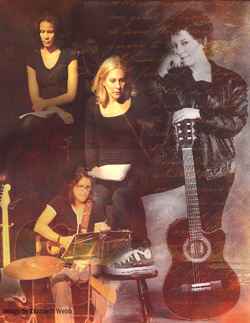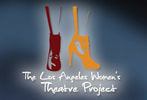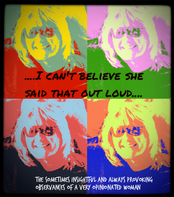
Verisimilitude
Dee Jae Cox
I am by nature an optimist. I love to laugh and I don’t hold on to grudges. I am sincerely hoping that is the key to my longevity and will compensate for the lack of physical exercise. But as a Playwright and theatrical Director and Producer, I have also had my rose colored glasses ripped off of my face a time or two. I try and see the glass as half full, rather than half empty. But imagine that glass as less than a quarter full. Imagine two equal sized water glasses, one that is 80% full and the second that is only 20% full. Stand them side-by-side and visually take in that image. That will give you a picture of gender parity in American theatre in 2013… or rather the lack of thereof.
The Hollywood Fringe Festival is always a good jumping off point for discussions on gender parity in Los Angeles theatre. The number of female participants is usually inflated because of the self-production element, which in all honesty, self-production is something I would encourage any woman with the skills and means, to consider at any time of the year. DIY! That is what motivated my Cofounder Michele Weiss and I, to found The Los Angeles Women’s Theatre Project, in 2007. I’m a Playwright and I understand the challenges that we face and I wanted to find a way to help more women get their work on to the stage, though all too soon realized that our efforts were only a small step in addressing an overwhelming need.
A playwright tells a story based on their unique perspective, which really does differ between men and women. As female playwrights, of course we can create male characters. And no doubt male playwrights can create female characters. But we’re talking about one simple thing. Truth. I had a cherished mentor and writing instructor who taught me the word, verisimilitude, the appearance or semblance of truth; likelihood; probability. He used to say that it was essential that a play possessed verisimilitude.
There is a serious lack of verisimilitude in American theatre, when eighty percent of the plays that are produced are written by and about men. The absence of gender parity is a crisis and has not progressed in the past century; so waiting for it to catch up to the times is not going to happen on its own. Not only are women’s perspectives and voices denied, but also the trickle down effect of this discriminatory practice is insidious and seeps into the pours of how we produce theatre. The dysfunction is reflected in the lack of protagonist and leading roles for actresses. It is reflected in the low percentage of female directors, stage crew and it most certainly impacts the number of stories about women or even stories from a woman’s perspective. When the majority of critics who review plays are male, it slants the reporting, the reviews and even the amount of media coverage and awards that women receive.
Perhaps we’ve been indoctrinated that if we get on our feminist soapboxes and demand equality, we are just being downright rude. Theatre is not just entertainment, it is an ageless reflection of our communities, our culture and our lives. If that reflection has historically lacked gender parity and truth, do we simply acquiesce to the status quo? Or do we find the courage to undertake the mission of creating equality in the art that we value so greatly? As Producers of theatre, we can not be willing to sacrifice verisimilitude or to deny our right to expect it.
(Verisimilitude was originally published in the LAFPI blog, 'Persons of Interest.')
Dee Jae Cox
I am by nature an optimist. I love to laugh and I don’t hold on to grudges. I am sincerely hoping that is the key to my longevity and will compensate for the lack of physical exercise. But as a Playwright and theatrical Director and Producer, I have also had my rose colored glasses ripped off of my face a time or two. I try and see the glass as half full, rather than half empty. But imagine that glass as less than a quarter full. Imagine two equal sized water glasses, one that is 80% full and the second that is only 20% full. Stand them side-by-side and visually take in that image. That will give you a picture of gender parity in American theatre in 2013… or rather the lack of thereof.
The Hollywood Fringe Festival is always a good jumping off point for discussions on gender parity in Los Angeles theatre. The number of female participants is usually inflated because of the self-production element, which in all honesty, self-production is something I would encourage any woman with the skills and means, to consider at any time of the year. DIY! That is what motivated my Cofounder Michele Weiss and I, to found The Los Angeles Women’s Theatre Project, in 2007. I’m a Playwright and I understand the challenges that we face and I wanted to find a way to help more women get their work on to the stage, though all too soon realized that our efforts were only a small step in addressing an overwhelming need.
A playwright tells a story based on their unique perspective, which really does differ between men and women. As female playwrights, of course we can create male characters. And no doubt male playwrights can create female characters. But we’re talking about one simple thing. Truth. I had a cherished mentor and writing instructor who taught me the word, verisimilitude, the appearance or semblance of truth; likelihood; probability. He used to say that it was essential that a play possessed verisimilitude.
There is a serious lack of verisimilitude in American theatre, when eighty percent of the plays that are produced are written by and about men. The absence of gender parity is a crisis and has not progressed in the past century; so waiting for it to catch up to the times is not going to happen on its own. Not only are women’s perspectives and voices denied, but also the trickle down effect of this discriminatory practice is insidious and seeps into the pours of how we produce theatre. The dysfunction is reflected in the lack of protagonist and leading roles for actresses. It is reflected in the low percentage of female directors, stage crew and it most certainly impacts the number of stories about women or even stories from a woman’s perspective. When the majority of critics who review plays are male, it slants the reporting, the reviews and even the amount of media coverage and awards that women receive.
Perhaps we’ve been indoctrinated that if we get on our feminist soapboxes and demand equality, we are just being downright rude. Theatre is not just entertainment, it is an ageless reflection of our communities, our culture and our lives. If that reflection has historically lacked gender parity and truth, do we simply acquiesce to the status quo? Or do we find the courage to undertake the mission of creating equality in the art that we value so greatly? As Producers of theatre, we can not be willing to sacrifice verisimilitude or to deny our right to expect it.
(Verisimilitude was originally published in the LAFPI blog, 'Persons of Interest.')


 RSS Feed
RSS Feed